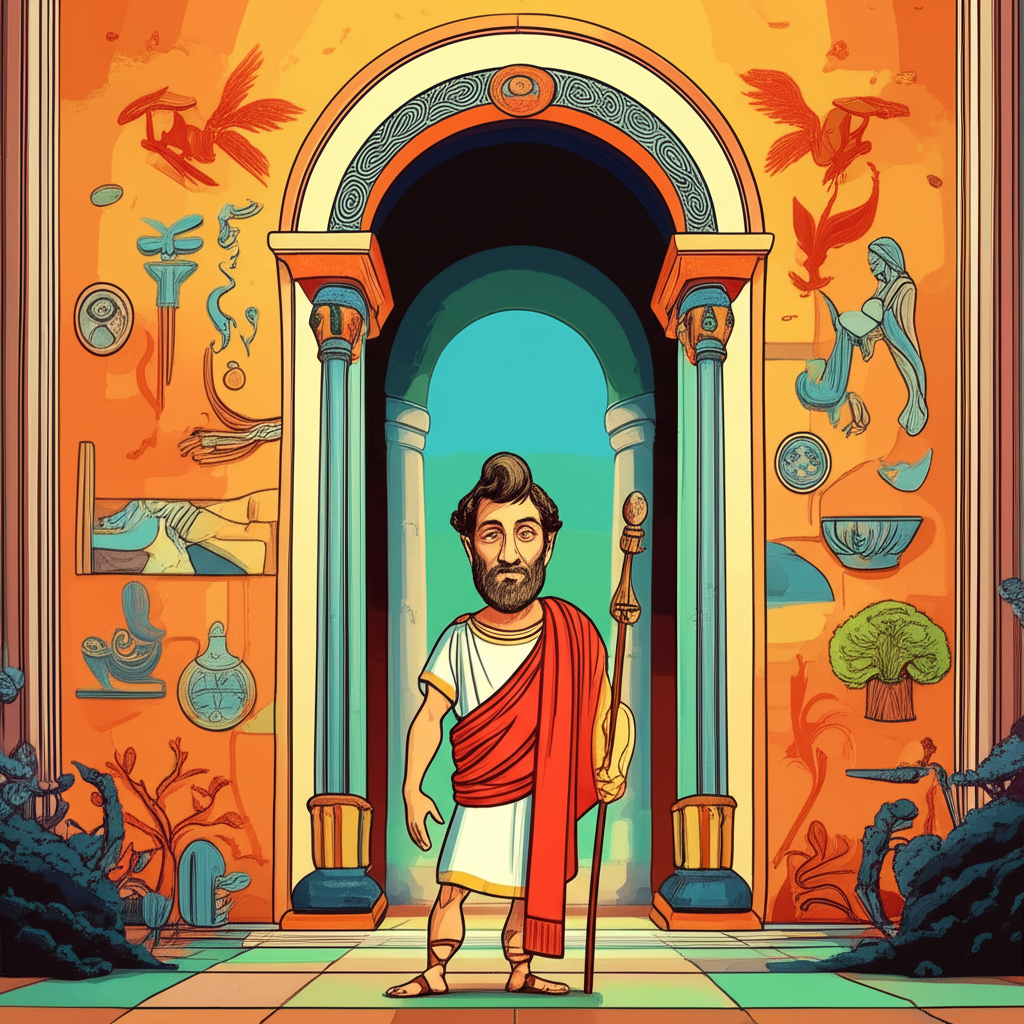In the tapestry of ancient Greek mythology, woven with threads of gods, heroes, and epic tales, lies a fascinating narrative that touches upon the very origins of the Trojan War: the Judgment of Paris. While the most prominent figures in this story are the divine goddesses and the mortal prince, whispers of a forgotten song, the "Songs of Thebes," are said to have resonated even then, carrying within them the echoes of a city steeped in legend and tragedy. This is not a factual account, but a traditional story, a piece of ancient folklore passed down through generations, offering a glimpse into the worldview of those who first told it.
The myths and legends that form the bedrock of Greek storytelling emerged from a vibrant and complex civilization that flourished in the Aegean Sea for centuries. The ancient Greeks, a people deeply connected to their land, their sea, and their pantheon of gods, viewed the world as a dynamic interplay of divine will and human endeavor. Their environment, characterized by rugged mountains, fertile valleys, and the vast, unpredictable sea, profoundly shaped their imagination. Natural phenomena were often attributed to the actions of gods and goddesses, and the fate of mortals was seen as intricately linked to their favor or displeasure. In this world, stories were not merely entertainment; they were a means of understanding the cosmos, of grappling with the mysteries of life and death, and of imparting moral lessons. The tales of gods and heroes served as a cultural compass, guiding their understanding of justice, fate, courage, and the consequences of human actions.
Within this rich mythological landscape, the Judgment of Paris is a pivotal event. It centers on a divine dispute and a mortal’s fateful decision, ultimately leading to the ten-year siege of Troy. The tale itself is not directly about Thebes, a powerful city-state in Boeotia, but the "Songs of Thebes" are imagined to have been a specific kind of musical or poetic tradition associated with that legendary city. Thebes, in Greek mythology, was a city burdened by a profound and recurring curse, a place where divine wrath and human hubris often played out in devastating cycles. The most famous of these cycles involved the royal house of Oedipus, a lineage marked by prophecy, incest, and a tragic struggle against fate. Therefore, any "Songs of Thebes" would likely have been imbued with themes of destiny, the weight of ancestry, the inevitability of sorrow, and perhaps, a deep understanding of the capricious nature of the gods. These songs, in this imaginative retelling, would not be sung by a specific creature, but rather represent a collective voice, a cultural expression of a city that knew the sting of divine judgment and the enduring power of human suffering.
The narrative of the Judgment of Paris, as it is commonly known, begins with a wedding – that of Peleus and Thetis, mortals and immortals alike were invited, save for Eris, the goddess of discord. Offended, Eris hurled a golden apple into the midst of the gathering, inscribed with the words "For the Fairest." This ignited a fierce quarrel among the most powerful goddesses: Hera, queen of the gods and wife of Zeus; Athena, goddess of wisdom and warfare; and Aphrodite, goddess of love and beauty. Zeus, unwilling to take sides, decreed that the judgment would fall to a mortal, the Trojan prince Paris. He was brought to Mount Ida, where the three goddesses appeared before him, each offering a bribe. Hera offered him dominion over all of Asia, Athena promised him wisdom and victory in battle, while Aphrodite, with a seductive whisper, offered him the most beautiful woman in the world.
It is at this crucial juncture, as Paris stands at the precipice of his decision, that the "Songs of Thebes" are imagined to have played a subtle but significant role. Picture Paris, a young prince, perhaps more attuned to the subtle nuances of life than his regal upbringing might suggest. As he contemplates the dazzling power offered by Hera and the strategic brilliance of Athena, his mind, perhaps influenced by the very air he breathed, carries the somber melodies of his homeland. Thebes, after all, had witnessed firsthand the devastating consequences of divine interference and the allure of fleeting earthly pleasures. The songs, therefore, would have been a subtle counterpoint to the goddesses’ grand promises. They would have sung of the weight of responsibility, the ephemeral nature of beauty, and the profound, often tragic, consequences of choices made under duress. They might have whispered of the suffering that can arise from a misplaced desire, a cautionary tale woven into the fabric of Theban identity. In this context, Aphrodite’s promise, while alluring, would have been viewed through the lens of Theban experience – a beauty that could lead to ruin, a love that might ignite a devastating conflict, mirroring the cycles of destruction that had plagued his own city.
The symbolism embedded within the Judgment of Paris, and by extension, the imagined "Songs of Thebes," is rich and multifaceted. For the ancient Greeks, the judgment itself represented the flawed nature of mortal choice when faced with divine power and temptation. It highlighted the struggle between reason (Athena), power (Hera), and desire (Aphrodite). The story served as a cautionary tale about the dangers of vanity, the allure of promises, and the potentially catastrophic outcomes of decisions driven by personal gain or lust. The hypothetical "Songs of Thebes," in this interpretation, would have amplified these themes by offering a deeper perspective on the cyclical nature of tragedy. They would have represented a profound understanding of fate and the human condition, reminding listeners that even the most beautiful desires could be tinged with sorrow, and that the choices of individuals, however seemingly small, could have far-reaching and devastating consequences. Thebes, as a city synonymous with tragedy, would have been the ultimate embodiment of these lessons, its songs a testament to the enduring power of suffering and the often-unforeseen repercussions of divine will.
In the modern world, the Judgment of Paris continues to resonate, appearing in various forms of literature, film, and art. It is a staple in retellings of the Trojan War, often explored through the psychological motivations of Paris and the competing desires of the goddesses. The story serves as a fertile ground for examining themes of beauty, temptation, and the beginnings of conflict. The concept of the "Songs of Thebes," though a fictional element woven into this narrative, adds another layer of imaginative depth, inviting us to consider how cultural history and lived experience might influence even the most divine of judgments. In academic studies, these myths are examined for their insights into ancient Greek society, their moral frameworks, and their understanding of human nature.
Ultimately, the story of the Judgment of Paris and the imagined "Songs of Thebes" are powerful reminders of the enduring legacy of human storytelling. These are not literal accounts of divine beings or events, but rather cultural artifacts, expressions of imagination and understanding from a bygone era. As Muslims, we recognize that only Allah (God) is the true Creator and Sustainer of all existence, the ultimate source of all truth. These ancient narratives, while devoid of divine authority, offer a unique window into the rich tapestry of human cultural heritage, demonstrating our innate drive to create meaning, to explore the complexities of life, and to pass down stories that shape our understanding of ourselves and the world around us. They stand as testaments to the power of imagination and the timeless tradition of storytelling.




